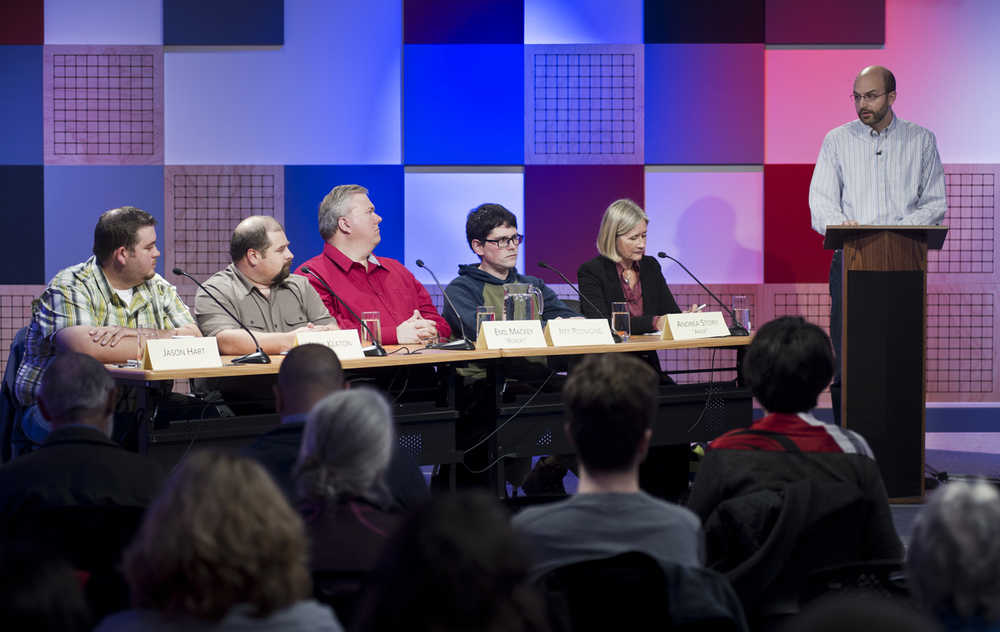All five candidates for the Juneau School Board agreed changes were needed to give students a better education amid budget cuts; it was in the details where differences between candidates arose.
A school board election debate inside the KTOO Public Media building Monday night allowed the candidates, running for three open board seats, to discuss their vision for the future of Juneau schools. About 50 community members attended.
The debate was a collaboration between Juneau Votes!, the Juneau Empire and KTOO Public Media. It was moderated by KTOO reporter Lisa Phu and the Empire’s Managing Editor Charles Westmoreland.
Candidates were asked to weigh in on a range of issues from funding travel for sports teams to achievement gaps between low- and high-income families. They were placed in the hot seat and were asked to vote, as if in a mock school board meeting, whether to approve a proposed charter school and to draw district lines.
Behind every question, they had to consider the ever-shrinking school district budget. Some of the candidates revealed what programs they would cut if they had to.
The election will be held Oct. 6.
A transparent board
With all that could change as seats are handed to new members, how well the community will remain informed was a topic of debate. Candidate Josh Keaton said he has often attended school board meetings and has found the record building process lacking.
“Sometimes there’s not a lot of deliberation,” Keaton said of his visits to meetings, adding to remarks he has made in the past that the school board often acts as a “rubber stamp” for the administration without great consideration for the community wants.
Andi Story, a candidate who has 12 years of board experience, said there is a set policy by which decisions are made and all school issues are considered through a process of multiple meetings. She conceded, however, that during a recent self-assessment by the board, public outlook was an area recognized as needing improvement.
Candidate Jeff Redmond, an assistant administrator at the Juneau Montessori School, said if elected he would take it one step further with new social media platforms where more opinions could be voiced.
An instance two years ago where the school board voted to ban middle school sports travel resurfaced during talks of board transparency.
“I’d like to revisit what the community puts together,” Keaton said on the matter. “They felt disenfranchised by no motioning being made or no discussion around it.”
Sports and bullying
Reopening talks around the sports ban travel was an area of great concern for candidate Jason Hart who coaches youth soccer and Gastineau Little League. He voiced opposition to a ban on middle school sports traveling that he said negatively impacts sports enrollment.
Although Hart continued to advocate the need for growth in sports, he said a stronger zero-tolerance outlook was needed for athletes to discourage incidents of bullying.
“I don’t feel that (sitting out) one or two games is setting the standard high enough, it needs to be a season,” Hart said. “I think the punishment needs to be fairly harsh and swift.”
Using a rebuttal card during the debate that allowed candidates to speak on issues they weren’t directly asked about, Emil “Robert” Mackey jumped in to say that bullying, on and off the field, is the number one issue people have approached him about with concerns.
“We have a cultural problem, not a policy problem,” Mackey said in response to thoughts that the board has been weak on enforcing issues.
Creating a safer school was also at the center of discussion when Erin’s Law, also known as the Alaska Safe Children’s Act, was brought up. The newly passed legislation would require school districts to provide age appropriate child sexual abuse prevention and teen dating violence prevention in the curriculum. Candidates Keaton, Hart and Story each agreed the issue was an important one that should have a greater light shone on it, but Story was hesitant to say she was in complete agreement with the law. It all came down to budgeting for many and the district being able to pay for what’s already in place.
Back to the budget
With Erin’s Law, Story voiced concerns over pieces of the legislation that could be costly for the district. Keeping the budget in mind was an important part of each question during the debate.
With the sports ban, Story too brought it back to the budget and how her years of experience made it clear it was the right, even if not popular move to make.
“The goal of the middle school activities is to have as many students participate at the lowest cost possible,” Story said.
A tighter budget was at the root of why Redmond said now may not be the best time for expanding, but rather focusing on the charter school already in place.
Keaton said the type of investment the proposed new science, technology, engineering and math charter school would require would best be used in a district-wide effort.
“I personally feel that STEM should be involved in all schools,” Keaton said.
On the subject of strengthening STEM learning in the school, Mackey said the real area that needs strengthening is whatever will get students ready for life after a high school diploma.
“What we’re really getting at is college and career readiness,” Mackey said. He added that courses that give students more access to University of Alaska Southeast programs are needed.

